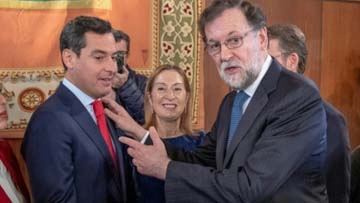
AFP, Madrid:
Spain’s former prime minister Mariano Rajoy, in power when Catalonia’s executive tried to secede, will testify Wednesday in the trial of separatist leaders in a highly sensitive hearing just two months before elections.
Rajoy governed Spain from 2011 until he was ousted in June last year by a no-confidence vote over a corruption trial that hit his conservative Popular Party (PP) and he was replaced by socialist rival Pedro Sanchez.
“His appearance is very important because he headed” the country before, during and after Catalonia’s regional government attempted to break from Spain in October 2017, said Paloma Roman, politics professor at Madrid’s Complutense University.
“As a witness, he has to tell the truth.”
It “won’t leave anyone indifferent,” she said as political debate becomes increasingly virulent ahead of snap general elections in April and European, municipal and regional polls in May.
The 63-year-old is due to appear in court at 4:00 pm local time (1500 GMT).
He was called to the stand by far-right party Vox, which is taking part in the trial as the “popular prosecution,” a set-up specific to Spain that allows any citizen or organisation to be an accuser in court alongside public prosecutors.
He will be questioned first by Vox representatives and defence lawyers.
Critics accuse Rajoy of having fuelled pro-independence passions, with support for separatism in the northeastern region leaping from 10 percent of votes in 2010 to 47.5 percent in 2017 – much of it under his mandate.
Even before he came to power, Rajoy had campaigned as opposition leader against a new, agreed status for the region that gave it extra powers and defined it as a “nation” within the Spanish state.
The Constitutional Court eventually overruled that nationhood claim, fuelling pro-independence passions.
Rajoy’s appearance “may be a key and dramatic moment of the trial,” said Joan Botella, politics professor at the Autonomous University of Barcelona.
He “will try to reject any responsibility” but “will have to respond to the question: why did he never sit down to talk” to the separatists?
“Rajoy didn’t do politics, he resorted to the law,” said Fernando Vallespin, politics professor at the Autonomous University of Madrid.
He said Rajoy was “always turning to the Constitutional Court to put a brake on the separatists’ initiatives.”
“The left criticises him for not having tried to resolve the problem politically” and “the right for not having acted sooner” against the separatist movement, Vallespin said.
Prosecutors are seeking seven to 25 years jail for the 12 Catalan separatist leaders and activists.
They are being tried for pushing an independence referendum in October 2017 in defiance of a court ban, and for a subsequent short-lived declaration of independence on October 27.
That prompted Rajoy’s government to sack the Catalan executive, dissolve the regional parliament, impose direct rule on the semi-autonomous region and call snap local elections.
Several days later, Catalonia’s then leader Carles Puigdemont fled Spain for Belgium along with several other colleagues. Other separatist leaders were put in pre-trial custody.
That prompted Rajoy’s deputy Soraya Saenz de Santamaria, who is also due to testify on Wednesday, to say her party had “beheaded” the independence movement.
But in the regional elections in December 2017, separatist parties once again won a majority in parliament.
Months later in June, Rajoy left politics “for good” after being ousted.

